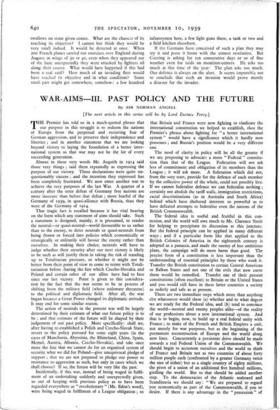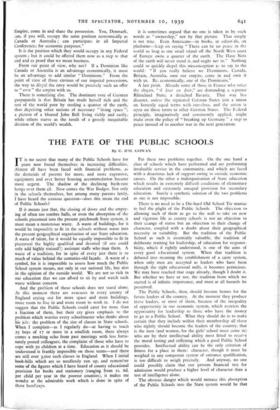WAR-AIMS-III. PAST POLICY AND THE FUTURE
By SIR NORMAN ANGELL
[The next article in this series will be by Lord Eustace Percy.]
THE Premier has told us in a much-quoted phrase that our purpose in this struggle is to redeem the nations of Europe from the perpetual and recurring fear of German aggression, and to preserve their independence and liberties ; and in another statement that we are looking beyond victory to laying the foundation of a better inter- national system so that war may not be the lot of every succeeding generation.
Almost in those very words Mr. Asquith in 1914 said those very things ; said them repeatedly as expressing the purpose of our victory. Those declarations were quite un- questionably sincere ; and the intention they expressed has been completely frustrated. We now enter another war to achieve the very purposes of the last War. A quarter of a century after the utter defeat of Germany free nations are more insecure than before that defeat ; more fearful of the Germany of 1939, in quasi-alliance with Russia, than they were of the Germany of 1914.
That tragic fact is recalled because it has vital bearing on the form which any statement of aims should take. Such a statement is designed, mainly, it is presumed, to render the neutral—or quasi-neutral—world favourable to us rather than to the enemy, to deter neutrals or quasi-neutrals from being drawn or forced into policies which economically or strategically or militarily will favour the enemy rather than ourselves. In making their choice, neutrals will have to judge whether their security after our next victory is likely to be such as will justify them in taking the risk of standing up to Totalitarian pressure, or whether it might not be better from their point of view to come to terms with Totali- tarianism before :haring the fate which Czecho-Slovakia and Poland and certain other of our allies have had to face since our last victory. Point is given to this considera- tion by the fact that the war seems to be in process of shifting from the military field (where stalemate threatens) to the political and diplomatic field. After all, the war began because a Great Power changed its diplomatic attitude. It may end for some similar reason.
The action of neutrals in the present war will be largely determined by their estimate of what our future policy is to be ; and that estimate of the future will be shaped by their judgement of our past policy. More specifically: shall we, after having re-established a Polish and Czecho-Slovak State, revert to the policy pursued for some eight years (in the cases of Manchuria, Abyssinia, the Rhineland, China, Spain, Memel, Austria, Albania, Czecho-Slovakia), and take once more the line that we cannot do for an organised system of security what we did for Poland—give unequivocal pledge of support ; that we are not prepared to pledge our power to resistance to aggression as such, but only in cases which we shall choose? If so, the future will be very like the past.
Incidentally, if this war, instead of being waged in fulfil- ment of an undertaking suddenly and unexpectedly given, so out of keeping with previous policy as to have been regarded everywhere as " revolutionary " (Mr. Eden's word), were being waged in fulfilment of a League obligation ; so that Britain and France were now fighting to vindicate the international constitution we helped to establish, then the Premier's phrase about fighting for " a better international system " would have a significance which it hardly now possesses ; and Russia's position would be a very different one.
The need of clarity in policy will be all the greater if we are proposing to advocate a more " Federal " constitu- tion than that of the League. Federation will not ask less of commitment and obligation of its members than the League ; it will ask more. A federation which did not, from the very start, provide for the defence of each member by the collective power of the whole, could not possibly live. If we cannot federalise defence we can federalise nothing ; certainly not abolish the tariff walls, immigration restrictions, racial discriminations (as in Australia and South Africa) behind which have sheltered interests so powerful as to have defeated attempts to federalise even the nations of the British Commonwealth.
The federal idea is useful and fruitful in this con- nexion, and the world will owe much to Mr. Clarence Streit for helping to precipitate its discussion at this juncture. But the federal principle can be applied in many different ways ; and if a particular form like that applied to the British Colonies of America in the eighteenth century is adopted as a panacea, and made the enemy of less ambitious plans, the campaign will do more harm than good. The precise form of a constitution is less important than the understanding of essential principles by those who work it. Transfer the British constitution to certain Central American or Balkan States and not one of the evils that now curse them would be remedied. Transfer one of their present constitutions (often excellent) to Britain or the United States and you would still have in these latter countries a society as orderly and safe as at present.
There are two immediate steps which more than anything else whatsoever would show (a) whether and to what degtee we are ready for the Federal idea, and (b) tend to convince the world—neutral and enemy peoples alike—of the reality of our professions about a new international system. And that is to begin, now, to build up a real federal unity with France ; to make of the French and British Empires a unit, not merely for war purposes, but as the beginning of the permanent reconstruction of Europe and the world along new lines. Concurrently a persistent drive should be made towards a real Federal Union of the Commonwealth. We should begin to accustom ourselves and the world to think of France and Britain not as two countries of about forty million people each (confronted by a greater Germany twice the size of either) but as a single country of eighty millions, the pivot of a union of an additional five hundred millions, girdling the world. But to that should be added another step. To the democracies of the Atlantic seaboard and Scandinavia we should say: " We are prepared to regard you economically as part of the Commonwealth, if you so desire. If there is any advantage in the " possession" of Empire, come in and share the possession. You, Denmark, can, if you will, occupy the same position economically as Canada or Australia ; can participate in all Imperial Conferences for economic purposes."
It is the position which they would occupy in any Federal system ; but it could be offered them now as a step to that end and as proof that we mean business.
From our point of view, why not? If a Dominion like Canada or Australia is an advantage economically, it must be an advantage to add similar " Dominions." From the point of view of those envious of our imperial possessions, the way to dispel the envy would be precisely such an offer to " own " the empire with us.
There is something else. The dominant note of German propaganda is that Britain has made herself rich and the rest of the world poor by stealing a quarter of the earth, thus depriving other nations of necessary " living space "; a picture of a bloated John Bull living richly and easily, while others starve as the result of a grossly inequitable division of the world's wealth. It is sometimes argued that no one is taken in by such words as " ownership," nor by that picture. That simply is not true. Even Americans—in books, in editorials, on platforms—keep on saying " There can be no peace in the world so long as one small island off the North West coast of Europe owns a quarter of the earth. The Have Nots of the earth will never stand it, and ought no to." Nothing could so quickly dispel this misconception a.; to say to the world: " If you really believe we Dominions, Canada, Britain, Australia, own our empire, come in and own it with us. Be, economically, one of the Dominions."
A last point. Already some of those in France who voice the slogan, " it Taut en finir," are demanding a separate Rhineland State, a detached Bavaria. That way lies disaster, unless the separated German States join a union on honestly equal terms with ourselves, and the union is open on those terms to other German States. The Fcderal principle, imaginatively and consistently applied, might make even the policy of " breaking up Germany " a step to peace instead of to another war in the next generation.





































 Previous page
Previous page